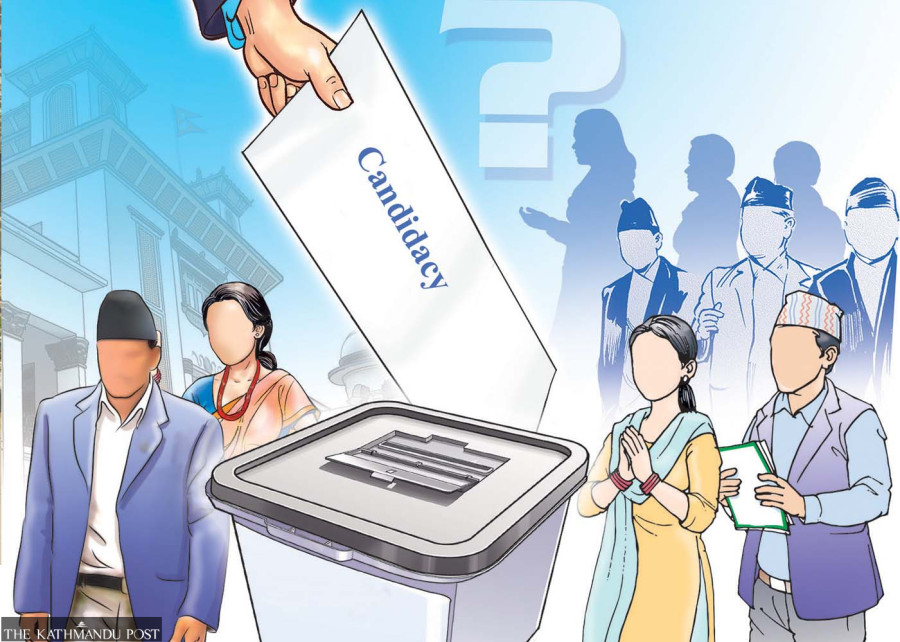Politics
Advocates of independent politics fall into party line
Campaigners aiming for a new way of doing politics organise for proportional electoral seats.
Binod Ghimire
A group of individuals, mainly professionals, started a “lauro abhiyan” (literally, cane campaign), encouraging qualified youths to contest the elections challenging the party leaders who have dominated politics for decades.
The campaign was inspired by the victory of Balen Shah and Harka Sampang Rai, who won mayoral elections as independent candidates, defeating prominent leaders from the major parties. The overwhelming support the independent candidates got in the local polls encouraged them and many others to contest the federal and provincial assembly elections. Shah and Rai won the election with the symbol cane, which is behind the nomenclature of the campaign.
As the campaign got traction, the professionals ended up forming a party before contesting the elections. The campaign has morphed into the Hamro Nepali Party. “We don’t have the structure like other parties, nor do we function like them,” Anant Raj Ghimire, chairperson of the party, told the Post. “We registered the party just to create a platform for the youths who have the fire to change and better their motherland. Our party is unlike the traditional parties.”
Ghimire’s claim is true that the Hamro Nepali Party is different to the traditional parties that are led by septuagenarians but legally all the parties have the same status—it is the party leadership that provides tickets to contest the polls, maintains party discipline. It is the party leadership—not an individual—that takes the final decision. Unlike independent candidates, those contesting with the party ticket cannot defy the party policy.
Asked if the hope for proportional seats was the reason to form the party, Ghimire agreed that it was partially true. “It is one of the reasons but not the only factor,” he said.
The party formed in July, just four months before the polls, has fielded 64 candidates for the upcoming election of House of Representatives and 117 for the provincial assemblies. It has submitted a list of 20 candidates under the proportional representation for the lower house.
Dambar Shahu and his team formed a network named “Swatantra Ummedwar Abhiyan” (independent candidates campaign) to organise the youths to come forward to contest the polls independently challenging the old faces from the mainstream parties.
However, before filing his candidacy from Kathmandu-1, he joined the Hamro Nepali Party. “The party is just a platform for youths like me to contest the election in an organised way,” Shahu told the Post. “Each lawmaker elected from our party will have an independent status.”
The experts, however, differ. They say when someone gets elected from a particular party s/he will have to follow the party discipline and its decisions. “One cannot be independent legally after getting elected from a political party,” Ram Krishna Tiwari, chief of the Central Department of Political Science at Tribhuvan University, told the Post. “However, making policy changes is possible only from a political party, not an independent candidate.”
Television personality Rabi Lamichhane first aspired to contest the elections independently. However, he later formed the Rastriya Swatantra Party, just a few weeks before the poll date was announced. His party has fielded 131 candidates for the House of Representatives.
Tiwari says very few candidates who have filed candidacy as independents are independent in true sense. Most of the 800 candidates who have filed nominations as independents are the rebels from different parties. They chose to break free from their parties after they were denied tickets.
Once elected, such candidates may go back to their parties. Atahar Kamal Musalman contested independently in the second Constituent Assembly elections after the Nepali Congress denied him a ticket. The party removed him from its positions after he chose to challenge the Congress candidate from Kapilvastu. However, the Congress welcomed him back after he won the elections. Chhakka Bahadur Lama, who got elected as an independent candidate from Humla in the previous election, associated himself with the CPN (Maoist Centre). He has recently joined the CPN-UML.
Political experts say the rival candidates or those youths contesting the polls by forming parties are not independents in true sense.
Even the youth voters echo the political experts. Many candidates who vowed to contest the elections independently have joined either the Hamro Nepali Party or Rastriya Swatantra Party.
“How can they function independently when they are affiliated to a political party? They aren’t independent anymore,” Pawan Acharya, a voter from Dang-1, told the Post. “It seems those advocating independent politics too have deep love for party politics.”




 11.12°C Kathmandu
11.12°C Kathmandu















